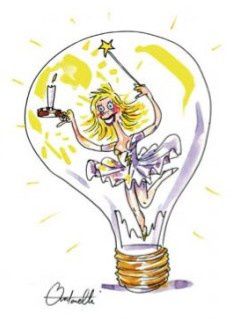Gérard Borvon
Emanation, fluid, particle, wave ... what is the identity of this elusive but very present thing whose quest dates back to twenty-five centuries and whose reality escapes us as soon as we think we have identified it?

In the course of this story - that of a succession of generally discrete phenomena which, under the watchful eye of observers, led to spectacular applications - we will meet dozens of scientists, inventors and researchers whose names we are already familiar: from Ampère to Watt and Thales from Miletus to Pierre and Marie Curie, it is also Volta and Hertz, Ohm and Joule, Franklin and Bell, Galvani and Siemens or Edison and Marconi who, among others, come to populate this adventure.
We will see amber lead to the lightning rod, contractions of a thigh of frog lead to the battery, the action of a current on a compass announce: the phone, the airwaves and electric motors, or the light filling a vacuum tube to produce a cathodic radiation. Of course, X-rays and radioactivity are also part of it.
From happy discoveries to dramatic experiences, electricity remains a natural force that has not ceased to inspire research and raise passions.
_________________________________________________________________
Table of Contents.
When was electricity born?
The Amber.
An attractive material.
The long sleep of the succin.
William Gilbert, the first electrician.
The birth of electricity.
Electricity is a general property of matter.
The first electric machines.
Otto de Guericke (1602-1686).
Francis Hauksbee (? - 1713).
Tube or globe?
Georg Matthias Bose (1710-1761).
Abbé Nollet (1700-1770).
The tray machines.
Gray, Dufay, Franklin and the electrical conduction.
Stephen Gray (1666-1736).
Late and fabulous discoveries.
Dufay: first ranking.
Electrical and non-electric bodies, what difference?
Benjamin Franklin: the vocabulary.
From Dufay to Ampere: from the two kinds of electricity to the both directions of electric current.
Dufay (1698-1739) and the electric repulsion.
A speech of the method.
Repulsion joins the attraction.
The law of Dufay.
Benjamin Franklin (1706-1790): a new vocabulary for a unique fluid.
Between Dufay and Franklin: Robert Symmer's silk stockings.
From loads to electrical currents.
From the Volta pile to the Ampère man.
Oersted: the pile and the compass.
Ampere and the conventional current direction.
The return of Franklin.
A situation blocked.
History of electricity. From the two kinds of electricity to both directions of electric current.
The Leiden bottle: the hidden power of electricity.
Terrible news from Leiden
This first electric capacitor, how does it work?
A miraculous bottle.
To the conquest of the celestial fire: the lightning rod.
The long history of thunder.
A thunderclap in the Parisian sky.
Coulomb and the time of the measure.
The law of Coulomb
From Galvani to Volta: the discovery of the electric battery.
Galvani and the frogs.
Volta and the battery.
Electricity and chemistry.
Humphry Davy (1778-1829).
A race for new elements.
The other magic stone: the magnet.
Chinese heritage.
Pierre de Maricourt (thirteenth century).
William Gilbert.
Coulomb and the measure.
Oersted, Ampere and the birth of electromagnetism,
or when the amber finds the magnet again.
Hans Christian Oersted (1777-1851).
Ampere (1775-1836).
An ingenious montage.
Earth is an electromagnet.
From mobile frame to solenoid.
From the solenoid to the right magnet.
Faraday and the fields.
Michael Faraday (1791-1867).
From the engine to the generator.
Lines of force and fields.
The law of Faraday.
Maxwell (1831-1879), putting the fields into equations.
Maxwell and the electromagnetic waves: at the rendezvous of light and electricity.
The luminous ether
Electromagnetic ether and the nature of light.
Establish the equations of propagation of an electromagnetic disturbance.
Build a coherent system of electrical units.
Hertz and the reality of electromagnetic waves.
At the conquest of high tensions: the Ruhmkorff coil.
Towards the discovery of the hertzian waves.
Does the ether exist? The experience of Michelson and Morley.
Branly, Marconi and the beginning of the radio.
The time of the engineers: the International Electricity Exhibition of 1881.
The era of electric generators.
The international exhibition of electricity in Paris.
The electric light.
The new generators.
The driving force of electricity.
After the exhibition of 1881.
The dark side of the electric force.
What future for electricity?
Electrical units, or when electricians give birth to a universal language.
The decimal metric system.
Birth of electric units.
Before 1881: different national systems.
1881: first international congress of electricians and first international system.
A success noticed.
The 1881 congress suites: the joule, the watt ...
Mechanics overwhelmed.
To the MKSA system.
A strange light: the cathodic radiation.
William Crookes and the radiant matter.
Röntgen and the X-rays.
Röntgen and the discovery
The epic of X-rays
X-rays, the latest fashion.
The other side of the medal
A memorial to the victims of radiation.
New radiation: the radioactive radiation.
Henri Becquerel: the discovery of radioactive radiation.
Marie Curie and the first hypotheses.
Polonium.
Radium.
Life and death of the electron.
Thomson and the discovery of the electron.
The electron and the atom, from Thomson to Rutherford.
Planck, Einstein and the birth of the photon.
The atom of Bohr.
Louis de Broglie and the wave nature of the electron.
When uncertainty becomes a principle.
And electricity, the electron, the electric charge in all this?
History to follow.
No science without his story.
This is just the beginning, the story continues.
Bibliography. Index of names; Index of subjects. The dates of the electricity.



/image%2F0561035%2F20140324%2Fob_6b7b8e_003-vinci-dodecaedre-02.jpg)